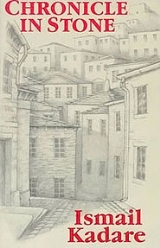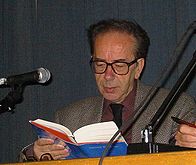
Chronicle in Stone
Encyclopedia
Chronicle in Stone is a novel by Ismail Kadare
. First published in Albanian
in 1971 and sixteen years later in English translation, it describes life in a small Albanian city during World War II.
Translated by Arshi Pipa, an Albanian émigré who lived in the United States, the book was initially published in English without the translator's name. Pipa had entered into a conflict with the publisher and/or with the author, and demanded to have his name taken off the translation. Pipa claimed that the several references to homosexuals, and homosexual activity throughout the novel (such as the bi-sexual Argjir Argjiri and the "woman with a beard", which Pipa takes to mean lesbian) were intended to raise the question of Enver Hoxha's own sexuality, a dangerous claim at the time.
The current edition was translated by David Bellos
. He was chosen by Kadare, as he had received a Booker prize
for translation work.
Each chapter is followed by an alternate chapter, a short "Fragment of a Chronicle" written by the town's official chronicler. The regular chapters are written in the first person, in the voice of a child, an alter ego of the young Kadare. He is fascinated with words, and reads Macbeth
, as Kadare himself did when he was eleven. He applies human drama, imagining blood and crime everywhere. In Kadare's home town, ravaged by history, we see characters walking down the street with severed heads under their arms; the Italian fascists hang several young Albanian rebels, the Greek occupants kill "enemies" chosen according to the whims of their spies, and the Germans indulge in the killing of hundred-year-old women.
 Toward the end of the novel, the absurdity of the political situation culminates in a whirlwind-like scenario, in which within two weeks or so, the town changes hands several times: from the Italians to the Greeks, back to the Italians, back to the Greeks, the Italians, the Greeks, until finally no one is in control. Each time the Italians come, they bring along two groups of women, one of nuns and one of prostitutes. Each time the town changes hands, another proclamation by another Garrison Commander is posted and another flag is raised. Each time another flag is raised, the Albanian Gjergj Pula changes his name: to Giorgio (when the Italians come), to Yiorgos (for the Greeks) and to Jurgen Pulen before the arrival of the Germans, a name he never gets a chance to use because the Germans kill him as soon as they enter the town. Nor does he get to use "Yogura", which he prepared in case of a Japanese invasion.
Toward the end of the novel, the absurdity of the political situation culminates in a whirlwind-like scenario, in which within two weeks or so, the town changes hands several times: from the Italians to the Greeks, back to the Italians, back to the Greeks, the Italians, the Greeks, until finally no one is in control. Each time the Italians come, they bring along two groups of women, one of nuns and one of prostitutes. Each time the town changes hands, another proclamation by another Garrison Commander is posted and another flag is raised. Each time another flag is raised, the Albanian Gjergj Pula changes his name: to Giorgio (when the Italians come), to Yiorgos (for the Greeks) and to Jurgen Pulen before the arrival of the Germans, a name he never gets a chance to use because the Germans kill him as soon as they enter the town. Nor does he get to use "Yogura", which he prepared in case of a Japanese invasion.
With its flavor, tone and spectacular events reminiscent of an ancient epic, Chronicle in Stone is probably the funniest and at the same time most tragic of Kadare's novels, depicting a world in which people believe in black magic, women live to be a hundred and fifty, and girls are drowned in wells by their families for having kissed a boy. Its characters, the folklore and mythology infusing historical circumstances call to mind some Caribbean novelists or even post-colonial African storytellers, and one cannot help compare its blend of surreal situations and political drama based on real events to South American novels, although Kadare apparently dislikes the label "magical realism" applied to his novels. It is not hard to imagine why: as some South-American novelists have said, he too could say that the world he describes is not "surreal" or "magical-realist;" it is simply the real, pre-modern world of the Balkans, albeit a world which is universalized through esthetic transfiguration.
Chronicle in Stone was published in Albania during the years of Enver Hoxha
, who came to power with the Communist Party
after World War II, and stayed there until his death in the mid-eighties. In this context, we can speculate on the reasons for the episodic appearance toward the end of the novel of a character described by the Italian garrison commander as "the dangerous Communist Enver Hoxha". Since the dictator, like Kadare himself, came from the city of Gjirokaster
(which with its steep hillsides and stone streets resembles the city of the book), this aspect of the protagonist's experience is probably authentic. However, government control of the Albanian publishing industry during the Hoxha regime may have provided an incentive for the dictator's inclusion, beyond narrative necessity.
—The New York Times Book Review
“No mere curiosity but a thoroughly enchanting novel–sophisticated and accomplished in its poetic prose and narrative deftness, yet drawing resonance from its roots in one of Europe’s most primitive societies.”
—John Updike, The New Yorker
Ismail Kadare
Ismail Kadare is an Albanian writer. He is known for his novels, although he was first noticed for his poetry collections. In the 1960s he focused on short stories until the publication of his first novel, The General of the Dead Army. In 1996 he became a lifetime member of the Academy of Moral...
. First published in Albanian
Albanian language
Albanian is an Indo-European language spoken by approximately 7.6 million people, primarily in Albania and Kosovo but also in other areas of the Balkans in which there is an Albanian population, including western Macedonia, southern Montenegro, southern Serbia and northwestern Greece...
in 1971 and sixteen years later in English translation, it describes life in a small Albanian city during World War II.
Translated by Arshi Pipa, an Albanian émigré who lived in the United States, the book was initially published in English without the translator's name. Pipa had entered into a conflict with the publisher and/or with the author, and demanded to have his name taken off the translation. Pipa claimed that the several references to homosexuals, and homosexual activity throughout the novel (such as the bi-sexual Argjir Argjiri and the "woman with a beard", which Pipa takes to mean lesbian) were intended to raise the question of Enver Hoxha's own sexuality, a dangerous claim at the time.
The current edition was translated by David Bellos
David Bellos
David Bellos is an English-born translator and biographer. Bellos currently teaches French and Comparative literature at Princeton University in the United States. He is also director of Princeton's Program in Translation and Intercultural Communication....
. He was chosen by Kadare, as he had received a Booker prize
Man Booker Prize
The Man Booker Prize for Fiction is a literary prize awarded each year for the best original full-length novel, written in the English language, by a citizen of the Commonwealth of Nations, Ireland, or Zimbabwe. The winner of the Man Booker Prize is generally assured of international renown and...
for translation work.
Each chapter is followed by an alternate chapter, a short "Fragment of a Chronicle" written by the town's official chronicler. The regular chapters are written in the first person, in the voice of a child, an alter ego of the young Kadare. He is fascinated with words, and reads Macbeth
Macbeth
The Tragedy of Macbeth is a play by William Shakespeare about a regicide and its aftermath. It is Shakespeare's shortest tragedy and is believed to have been written sometime between 1603 and 1607...
, as Kadare himself did when he was eleven. He applies human drama, imagining blood and crime everywhere. In Kadare's home town, ravaged by history, we see characters walking down the street with severed heads under their arms; the Italian fascists hang several young Albanian rebels, the Greek occupants kill "enemies" chosen according to the whims of their spies, and the Germans indulge in the killing of hundred-year-old women.

With its flavor, tone and spectacular events reminiscent of an ancient epic, Chronicle in Stone is probably the funniest and at the same time most tragic of Kadare's novels, depicting a world in which people believe in black magic, women live to be a hundred and fifty, and girls are drowned in wells by their families for having kissed a boy. Its characters, the folklore and mythology infusing historical circumstances call to mind some Caribbean novelists or even post-colonial African storytellers, and one cannot help compare its blend of surreal situations and political drama based on real events to South American novels, although Kadare apparently dislikes the label "magical realism" applied to his novels. It is not hard to imagine why: as some South-American novelists have said, he too could say that the world he describes is not "surreal" or "magical-realist;" it is simply the real, pre-modern world of the Balkans, albeit a world which is universalized through esthetic transfiguration.
Chronicle in Stone was published in Albania during the years of Enver Hoxha
Enver Hoxha
Enver Halil Hoxha was a Marxist–Leninist revolutionary andthe leader of Albania from the end of World War II until his death in 1985, as the First Secretary of the Party of Labour of Albania...
, who came to power with the Communist Party
Communist party
A political party described as a Communist party includes those that advocate the application of the social principles of communism through a communist form of government...
after World War II, and stayed there until his death in the mid-eighties. In this context, we can speculate on the reasons for the episodic appearance toward the end of the novel of a character described by the Italian garrison commander as "the dangerous Communist Enver Hoxha". Since the dictator, like Kadare himself, came from the city of Gjirokaster
Gjirokastër
Gjirokastër is a city in southern Albania with a population of 43,000. Lying in the historical region of Epirus, it is the capital of both the Gjirokastër District and the larger Gjirokastër County...
(which with its steep hillsides and stone streets resembles the city of the book), this aspect of the protagonist's experience is probably authentic. However, government control of the Albanian publishing industry during the Hoxha regime may have provided an incentive for the dictator's inclusion, beyond narrative necessity.
Reception
“A triumph . . . A beguiling conjunction of realism and fantasy.”—The New York Times Book Review
“No mere curiosity but a thoroughly enchanting novel–sophisticated and accomplished in its poetic prose and narrative deftness, yet drawing resonance from its roots in one of Europe’s most primitive societies.”
—John Updike, The New Yorker
The New Yorker
The New Yorker is an American magazine of reportage, commentary, criticism, essays, fiction, satire, cartoons and poetry published by Condé Nast...

